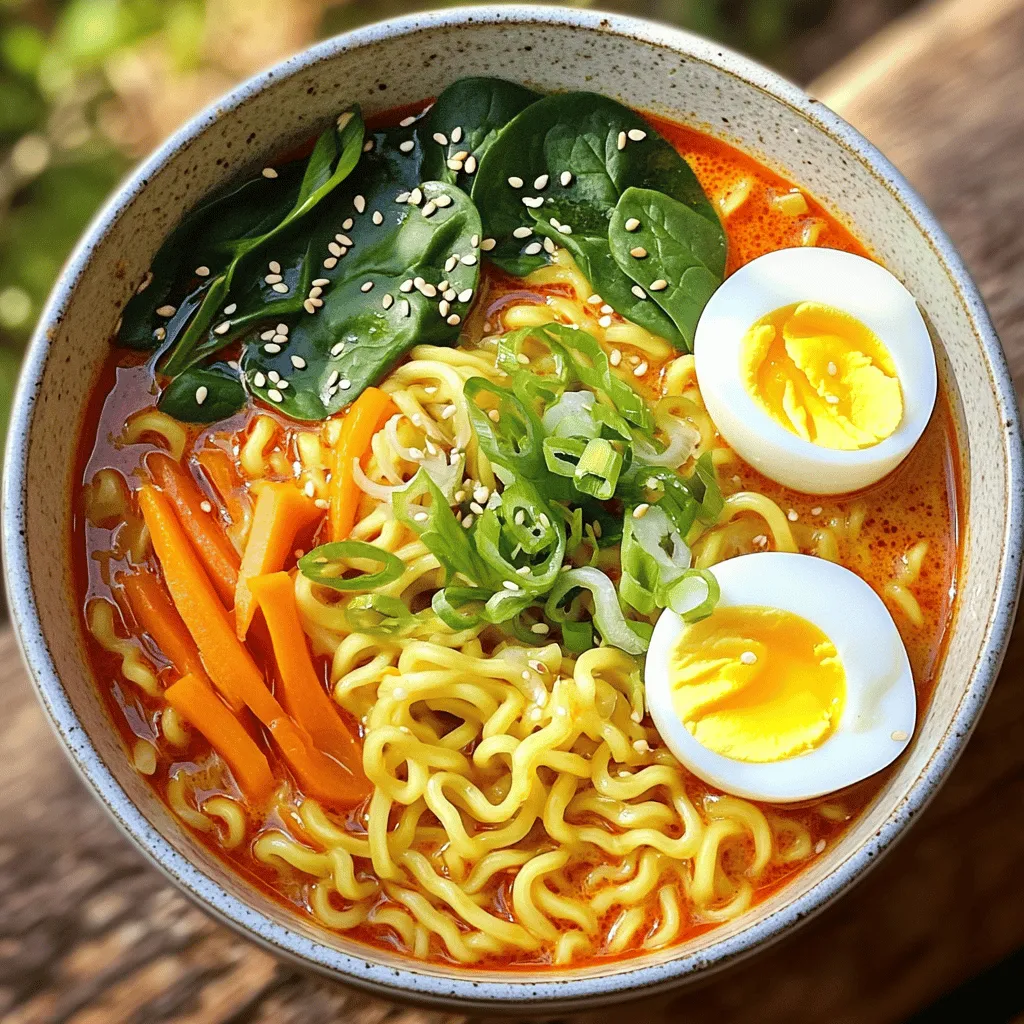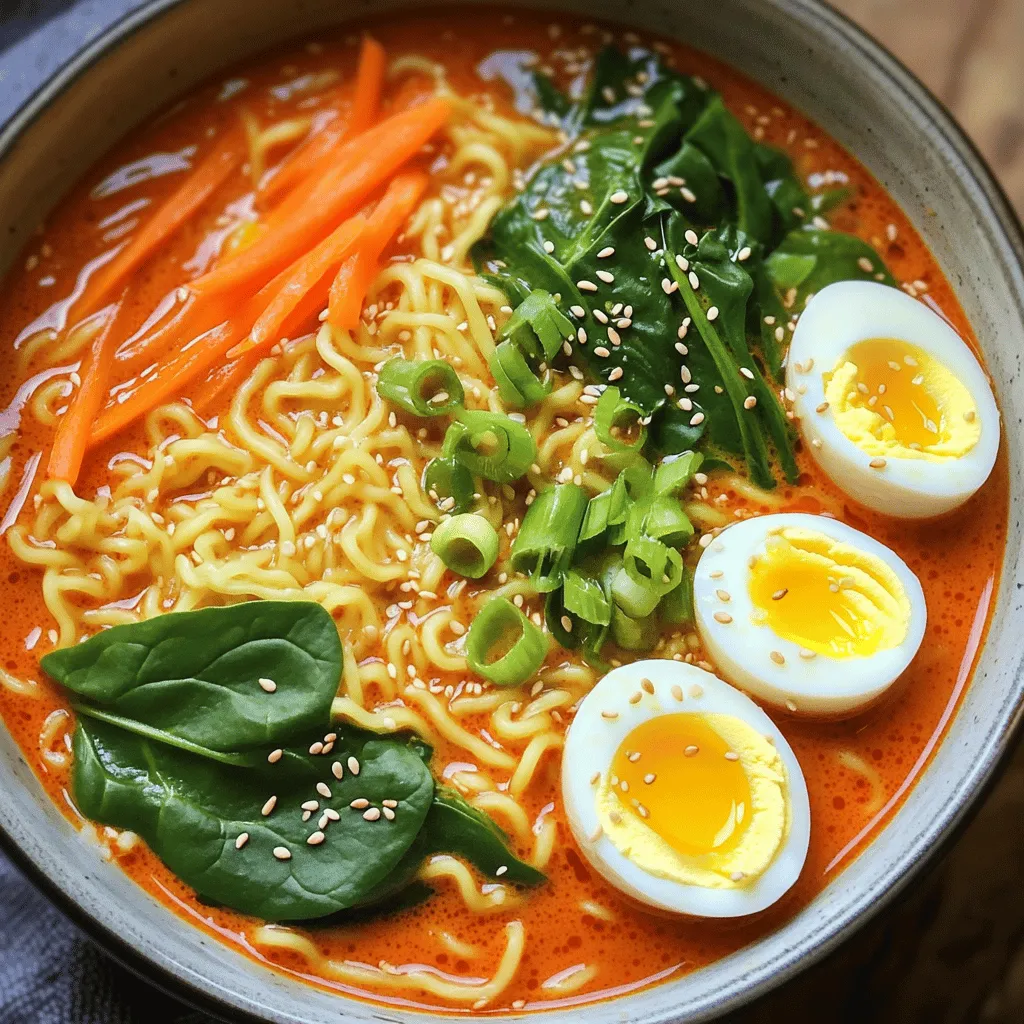Are you ready to spice up your dinner with a bowl of creamy gochujang ramen? This easy dish packs a flavorful punch that blends rich broth with savory heat. You’ll find all the essential ingredients and simple steps to craft this dish right at home. Plus, I’ll share tips for customizing your bowl to suit your taste. Get ready to impress your family and friends with this delightful recipe!

Ingredients
Essential Ingredients for Creamy Gochujang Ramen
To make Creamy Gochujang Ramen, you need some key ingredients. Here’s what you need:
– 200g ramen noodles
– 2 tablespoons gochujang (Korean chili paste)
– 1 cup coconut milk
– 2 cups vegetable broth
– 1 tablespoon sesame oil
– 1 clove garlic, minced
– 1 small onion, chopped
– 1 cup baby spinach
– 1 carrot, julienned
– 1 green onion, sliced
– 1 tablespoon soy sauce
– Salt and pepper to taste
– 2 boiled eggs (optional for topping)
– Sesame seeds, for garnish
These ingredients create a rich and creamy broth that warms you up.
Optional Ingredients for Customization
You can play with the recipe. Here are some optional ingredients:
– Mushrooms for extra texture
– Tofu for added protein
– Hot pepper flakes for more heat
– Cilantro for fresh flavor
Feel free to add what you love. This dish is all about personal taste.
Substitutions and Adjustments
Sometimes, you might not have all the ingredients. Here are some great swaps:
– Use chicken or beef broth instead of vegetable broth.
– Try almond milk if you can’t find coconut milk.
– For gluten-free, use rice noodles instead of ramen.
These substitutions still give you a tasty dish. Don’t be afraid to experiment!
Step-by-Step Instructions
Cooking the Ramen Noodles
First, bring a pot of water to a boil. When the water is bubbling, add 200g of ramen noodles. Cook them according to the package instructions, usually about 3 to 4 minutes. Once done, drain the noodles and put them aside. This will keep them from getting soggy.
Preparing the Flavor Base
Next, take a large pot and heat 1 tablespoon of sesame oil over medium heat. Once hot, add 1 small chopped onion. Sauté the onion for about 3 minutes until it looks soft and clear. Then, add 1 clove of minced garlic and 2 tablespoons of gochujang. Stir these ingredients for 1 minute until you smell the great aroma.
Combining Broths and Vegetables
Now, pour in 1 cup of coconut milk and 2 cups of vegetable broth. Stir well to mix everything together. Bring this mixture to a gentle simmer. After that, add 1 cup of baby spinach and 1 julienned carrot. Let the mix simmer for another 5 minutes. This will make the vegetables tender and flavorful.
Final Assembly and Serving
To finish, stir in 1 tablespoon of soy sauce. Add salt and pepper to taste. If you want more heat, you can add more gochujang. Now, gently add the cooked ramen noodles to the pot. Stir everything together to coat the noodles in the creamy broth. Heat for another 2 to 3 minutes. Finally, ladle the ramen into bowls. Top with sliced green onions, a boiled egg if you like, and sprinkle sesame seeds on top for a nice touch. Enjoy the warm, creamy goodness!
Tips & Tricks
How to Enhance Flavor and Texture
To make your creamy gochujang ramen even tastier, think about these tips:
– Use fresh ingredients. Fresh vegetables boost flavor. Look for bright green spinach and crisp carrots.
– Adjust the gochujang. Add more gochujang for heat. Taste as you go to find your perfect balance.
– Add umami depth. Consider adding a splash of soy sauce. It enhances the broth’s richness.
– Include herbs. Fresh cilantro or basil can brighten the dish. Just sprinkle them on before serving.
Cooking Suggestions for Perfect Noodles
Cooking noodles correctly is key to great ramen:
– Use plenty of water. A large pot helps noodles cook evenly. Too little water makes them sticky.
– Follow package instructions. Each brand may have different cooking times. Check to avoid overcooking.
– Rinse with cold water. After draining, rinse noodles briefly. This stops cooking and prevents clumping.
– Combine quickly. Add noodles to the broth right before serving. This keeps them warm and flavorful.
Serving Suggestions and Additional Toppings
Presentation matters, so consider these serving ideas:
– Use deep bowls. They hold more broth and keep noodles submerged. This makes every bite flavorful.
– Top generously. Add sliced green onions and sesame seeds. They add crunch and flavor.
– Include boiled eggs. A soft-boiled egg adds richness. Cut it in half for a nice visual touch.
– Try pickled veggies. They add a zingy contrast. Radishes or kimchi work well for extra flavor.

Variations
Different Types of Ramen and Noodle Options
You can use many types of noodles for your creamy gochujang ramen. Ramen noodles are a classic choice. However, you can also try udon or soba noodles. Udon noodles are thick and chewy. They add a nice bite. Soba noodles are made from buckwheat, giving a nutty flavor. You can even use rice noodles for a gluten-free option. Experiment with different noodles to find your favorite.
Protein Additions for a Heartier Meal
If you want a heartier meal, adding protein is a great idea. You can include chicken, shrimp, or tofu. For chicken, use cooked, shredded meat for easy mixing. If you like shrimp, just add it in the last few minutes of cooking. Tofu is perfect for a plant-based meal. Use firm tofu and sauté it to give it a nice texture. Each protein adds flavor and makes the dish more filling.
Vegan and Gluten-Free Adaptations
You can easily make this dish vegan and gluten-free. For a vegan option, skip the eggs and use vegetable broth. Make sure your noodles are gluten-free, like rice noodles. You can also replace coconut milk with almond or oat milk for a lighter taste. Using these swaps keeps the creamy texture while fitting your diet. Enjoy your creamy gochujang ramen without worry!
Storage Info
Best Practices for Storing Leftovers
To store your creamy gochujang ramen, first let it cool. Place leftovers in an airtight container. This keeps your ramen fresh. Store it in the fridge. It stays good for up to three days. If you used eggs, it’s best to eat them soon. They may not stay fresh for long.
Reheating Tips for Creamy Gochujang Ramen
When reheating ramen, add a splash of broth or water. This helps prevent it from drying out. Heat it on the stove over low heat. Stir gently to mix the flavors. You can also use a microwave. Heat in short bursts, stirring in between. Make sure it’s hot all the way through before serving.
Freezing Instructions and Recommendations
Freezing creamy gochujang ramen is a bit tricky. The noodles can get mushy when thawed. If you want to freeze it, store the broth and noodles separately. Use freezer-safe containers. The broth can last up to three months in the freezer. When you’re ready to eat, thaw the broth overnight in the fridge. Cook fresh noodles to add to the reheated broth. This way, your ramen stays tasty and fresh!
FAQs
What is Gochujang and Why Use It?
Gochujang is a Korean chili paste. It has a sweet, spicy, and umami flavor. Using gochujang adds depth to your ramen. It makes the dish more exciting and flavorful. This paste blends well with coconut milk, creating a creamy base. You can find it in Asian markets or online.
Can I make this recipe spicy?
Yes, you can! If you want more heat, just add extra gochujang. Start with a little and taste as you go. This way, you control the spice level. You can also add chili flakes or fresh chili slices. These options let you customize the heat just how you like it.
How do I make the broth less creamy?
To make the broth less creamy, use less coconut milk. Try using half a cup instead of a full cup. You can also add more vegetable broth. This will lighten the broth while keeping the flavor. Mixing in some water can achieve the same effect. Just be sure to taste and adjust the seasoning.
What can I serve with Creamy Gochujang Ramen?
You can serve this ramen with various toppings. Try adding sliced green onions and sesame seeds for crunch. Boiled eggs are a great choice for extra protein. You can also serve it with pickled vegetables or kimchi. These sides pair well and enhance the meal’s flavors.
This blog post covered the essential and optional ingredients for creamy gochujang ramen. We walked through cooking methods, flavor tips, and serving ideas. You learned about variations, from noodles to vegan options. We also discussed storage tips for your leftovers.
Gochujang ramen is fun to make and enjoy. Customize it to fit your taste. Have fun experimenting with new flavors and ingredients. You can create a dish that warms your stomach and soul.

